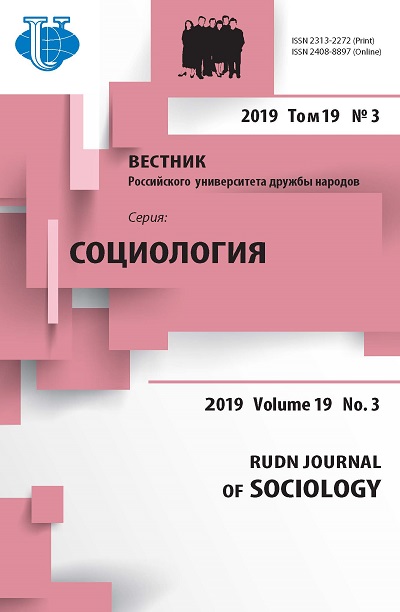Sociology as a resource of “intelligent power” in the globalization era
- Authors: Nikiforov Y.A.1
-
Affiliations:
- National Research Saratov State University named after N.G. Chernyshevsky
- Issue: Vol 19, No 3 (2019)
- Pages: 517-529
- Section: Sociological lectures
- URL: https://journals.rudn.ru/sociology/article/view/21685
- DOI: https://doi.org/10.22363/2313-2272-2019-19-3-517-529
- ID: 21685
Cite item
Full Text
Abstract
The current state of the global social system assumes a compulsory external impact on the national communities of a complex of factors defined in social science as “globalization”. Together with the creation of the general economic, social, cultural space that intensifies the international interaction, globalization increases vulnerability of separate social systems. In recent decades, the strategies of J. Nye have become the most popular paradigms of the international competition: hard, soft, smart and intelligent power. The essence of the theoretical conceptualization of the “intelligent power” is that it is based mainly on internal resources and allows to focus on developing the national worldview platform consolidating basic meanings of social system and goals of its development. The possibilities of sociology as a resource of “intelligent power” are in its expert, scientific-educational, innovative and discursive potential. Unfortunately, despite its extensive and powerful network of the scientific-educational institutions financed from the budgetary funds, sociology still does not work in national interests. Sociology is the only social science with a full set of theoretical and methodological tools to gather and analyze social information, to predict social processes, and to work for the following spheres of “intelligent power”: think tanks with the participation of sociologists can provide authorities with necessary information, consult them on important decisions, stimulate interest in obtaining new data and starting new studies, serve as a platform for the interaction with professional researchers of social life; introducing educational programs competitive at the international level and based on the production of new knowledge and its effective use in the educational process; critical evaluation of foreign ideologies and conceptions with the subsequent development of one’s own ideas and new social paradigms taking into account national interests.
About the authors
Ya. A. Nikiforov
National Research Saratov State University named after N.G. Chernyshevsky
Author for correspondence.
Email: nikiforovy@mail.ru
доктор социологических наук, профессор кафедры социологии регионов Саратовского национального исследовательского государственного университета им. Н.Г. Чернышевского
Astrakhanskaya St., 83, Saratov, 410012, RussiaReferences
- Bauman Z. Individualizirovannoe obshchestvo [The Individualized Society]. Moscow; 2002 (In Russ.).
- Beck U. Chto takoe globalizatsiya? [What is Globalization?]. Moscow; 2001 (In Russ.).
- Kimelev Yu.A., Polyakova N.L. Teoriya obshchestva Antony Giddensa [Anthony Giddens’ theory of society]. Sovremennye sociologicheskie teorii obshchestva. Moscow; 1996 (In Russ.).
- Liu Zaiqi. “Myagkaya sila” v strategii razvitiya Kitaya [Soft power in the development strategy of China]. Politicheskie Issledovanija. 2009; 4 (In Russ.).
- Intellektualnaya ekspansiya. Rossijskie “fabriki mysli”: vozmozhnosti vliyaniya v mezhdunarodnom ekspertno-politicheskom prostranstve [Intellectual expansion. Russian “think tanks”: Possibilities of influence in the international expert-political space]. http://ruspolitology.ru/wp-content/uploads/2018/03/doklad-think-thanks-eisr.pdf (In Russ.).
- Osnovnye napravleniya politiki RF v sfere mezhdunarodnogo kulturno-gumanitarnogo sotrudnichestva [The main directions of the Russian policy in the international cultural and humanitarian cooperation]. http://www.mid.ru/foreign_policy/official_documents/-/asset_publisher/ CptICkB6BZ29/content/id/224550 (In Russ.).
- Polanyi K. Velikaya transformatsiya [Great Transformation]. Moscow; 2007 (In Russ.).
- Rossijskie fabriki mysli [Russian think tanks]. http://www.sitnikov.com/materials/rossijskie-fabriki-mysli (In Russ.).
- Stoletov O.V. Strategiya “razumnoj sily” v politike globalnogo liderstva [The strategy of “intellectual power” in the policy of global leadership]: Avtoref. dis. k.p.n. Moscow; 2015 (In Russ.).
- Torkunov A.V. Obrazovanie kak instrument “myagkoj sily” vo vneshnej politike Rossii [Education as the tool of “soft power” in the Russian foreign policy]. http://ehd.mgimo.ru/ IORManagerMgimo/file?id=DBCAFE0C-DAD8-6FAE-48F4-57A948C3CB44 (In Russ.).
- Feldman D. Ohlos v seti mirovoj politiki [Ohlos in the network of world politics]. http://russiancouncil.ru/ blogs/riacexperts/1126 (In Russ.).
- Giddens A. The Consequences of Modernity. Stanford; 1990.
- Gouldner A.W. The Two Marxsism: Contradictions and Anomalies in the Development of Theory. New York; 1980.
- Nye J. Bound to Lead: The Changing Nature of American Power. New York; 1991.
- Wallerstein I. The present state of the debate on world inequality. The Capitalist World-System: Essays. Cambridge-Paris; 1979.
Supplementary files













